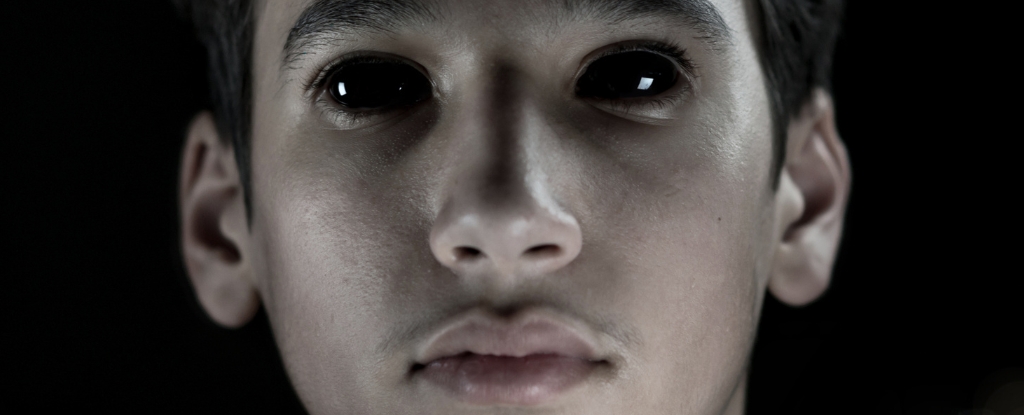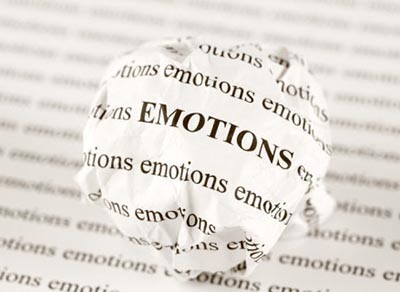

Reality is a consciousness hologram set in linear time to study the full gamut of emotions. Physical reality is created by electromagnetic energy, forever seeking balance, but by its very nature, bipolar. The brain is a computer through which the physical and emotional bodies interact. There are an endless number of emotions most people will experience, the most painful seemingly "loss".
We spend all of our time in physical reality experiencing and dealing with our emotions - how to cope, how to heal, what is genetically and environmentally driven and more. The bipolar nature of reality does not make it easy to overcome and move past emotional issues, yet we try and try again. Lucky are those born with balanced brain chemistry programmed to attract less drama and greater accomplishment with less effort. It takes a lot more work to be dysfunctional than functional.
In psychology and philosophy, emotion is a subjective, conscious experience characterized primarily by psychophysiological expressions, biological reactions, and mental states. Emotion is often associated and considered reciprocally influential with mood, temperament, personality, disposition, and motivation. It also is influenced by hormones and neurotransmitters such as dopamine, noradrenaline, serotonin, oxytocin, cortisol and GABA. Emotion is often the driving force behind motivation, positive or negative. An alternative definition of emotion is a "positive or negative experience that is associated with a particular pattern of physiological activity."
The physiology of emotion is closely linked to arousal of the nervous system with various states and strengths of arousal relating, apparently, to particular emotions. Emotions are a complex state of feeling that results in physical and psychological changes that influence our behavior. Those acting primarily on emotion may seem as if they are not thinking, but cognition is an important aspect of emotion, particularly the interpretation of events. For example, the experience of fear usually occurs in response to a threat. The cognition of danger and subsequent arousal of the nervous system (e.g. rapid heartbeat and breathing, sweating, muscle tension) is an integral component to the subsequent interpretation and labeling of that arousal as an emotional state. Emotion is also linked to behavioral tendency. Extroverted people are more likely to be social and express their emotions, while introverted people are more likely to be more socially withdrawn and conceal their emotions.
Research on emotion has increased significantly over the past two decades with many fields contributing including psychology, neuroscience, endocrinology, medicine, history, sociology, and even computer science. The numerous theories that attempt to explain the origin, neurobiology, experience, and function of emotions have only fostered more intense research on this topic. Current areas of research in the concept of emotion include the development of materials that stimulate and elicit emotion. In addition PET scans and fMRI scans help study the affective processes in the brain. Read more ...

If you're grieving - live for those who have passed and those who live on. Don't feel bad if you can't connect with the spirit world. Not everybody's brain is programmed to do that. Connections linger on the emotional level. In the physical it's all projected illusion. One day you will understand what separates and what connects us.
Empathy: Researchers found eight body-like maps in the visual cortex that organize what we see in the same way the brain organizes touch. Science Daily - December 23, 2025

These maps help us instantly understand actions, emotions, and intentions in others. The discovery sheds light on human empathy and opens doors for new brain-based therapies and AI systems that better understand the body.
How can people with autism and social anxiety understand others' emotions better? Medical Express - January 23, 2025

We not only observe other people's emotions, but also subconsciously mirror them
Psychologist Explains How to Stop Using Food as a Coping Mechanism Science Alert - September 29, 2024

"Emotional eating" refers to the eating behaviors (typically eating more) that occur in response to difficult emotions. Research shows around 20 percent of people regularly engage in emotional eating, with a higher prevalence among adolescents and women. In a study of more than 1,500 adolescents, 34 percent engaged in emotional eating while sad and 40 percent did so while anxious. Foods consumed are often fast-foods and other energy-dense, nutrient-poor convenience foods.
Feeling Happy And Sad? Here's How Our Brains Manage Mixed Emotions Science Alert - September 25, 2024
A research group found that volunteers' physiological responses - such as heart rate and skin conductance - display unique patterns during experiences that are both disgusting and funny, compared with either category separately.
Scientists Discovered a 'Fear Switch' in The Brain, And How to Turn It Off Science Alert - March 15, 2024

There are times when fear isn't an appropriate reaction. In cases such as anxiety disorders and stress disorders, the fear response can become disproportionate to the situation or environment of the individual, seriously impeding mental health and quality of life.
The answer is simple. It's the way our brains are programmed. We exist in a simulation whose prime directive is to study emotions utilizing the concept of linear time. People are more likely to remember things that create negative emotions such as fear - than positive ones.
Why do we remember emotional events better than non-emotional ones? Medical Express - January 19, 2023
Most people remember emotional events like their wedding day very clearly, but researchers are not sure how the human brain prioritizes emotional events in memory. In a study a team identified a specific neural mechanism in the human brain that tags information with emotional associations for enhanced memory.
How the brain stores remote fear memory - a memory of traumatic events that occurred in the distant past Medical Express - December 23, 2022
A remote fear memory is a memory of traumatic events that occurred in the distant past - a few months to decades ago. The study demonstrates that remote fear memories formed in the distant past are permanently stored in connections between memory neurons in the prefrontal cortex, or PFC. It is the prefrontal memory circuits that are progressively strengthened after traumatic events and this strengthening plays a critical role in how fear memories mature to stabilized forms in the cerebral cortex for permanent storage.
Study examines why the memory of fear is seared into our brains Science Daily - June 1, 2022
Neuroscientists have been studying the formation of fear memories in the emotional hub of the brain -- the amygdala -- and think they have a mechanism. Experiencing a frightening event is likely something you'll never forget. But why does it stay with you when other kinds of occurrences become increasingly difficult to recall with the passage of time? A team of neuroscientists from the Tulane University School of Science and Engineering and Tufts University School of Medicine have been studying the formation of fear memories in the emotional hub of the brain -- the amygdala -- and think they have a mechanism. In a nutshell, the researchers found that the stress neurotransmitter norepinephrine, also known as noradrenaline, facilitates fear processing in the brain by stimulating a certain population of inhibitory neurons in the amygdala to generate a repetitive bursting pattern of electrical discharges. This bursting pattern of electrical activity changes the frequency of brain wave oscillation in the amygdala from a resting state to an aroused state that promotes the formation of fear memories.
Team identifies new brain region that suppresses fear Medical Express - October 30, 2018
A study conducted at Texas A&M University has identified a new area in the brain involved in inhibiting fear, a discovery that holds potential for clinical interventions in patients with psychiatric diseases such as post-traumatic stress disorder (PTSD)
Investigating emotional spillover in the brain Medical Express - June 17, 2017
Life is full of emotional highs and lows, ranging from enjoying an activity with a loved one and savoring a delicious meal to feeling hurt by a negative interaction with a co-worker or that recent scuffle with a family member. But when we let emotions from one event carry on to the next, such spillover can color our impressions and behavior in those new situations - sometimes for the worse.
Eye expressions offer a glimpse into the evolution of emotion Science Daily - April 18, 2017
New research reveals why the eyes offer a window into the soul. According to the study, people interpret a person's emotions by analyzing the expression in their eyes -- a process that began as a universal reaction to environmental stimuli and evolved to communicate our deepest emotions. According to the recent study we interpret a person's emotions by analyzing the expression in their eyes -- a process that began as a universal reaction to environmental stimuli and evolved to communicate our deepest emotions.
We read emotions based on how the eye sees Medical Express - February 22, 2017
We use others' eyes - whether they're widened or narrowed - to infer emotional states, and the inferences we make align with the optical function of those expressions. The research reveals, for example, that people consistently associate narrowed eyes - which can enhance visual discrimination - with discrimination-related emotions including disgust and suspicion. Findings show that how we see directly relates to how others see us, through our facial expressions. This is a clear demonstration of emotional embodiment, from sender to receiver.
Is there such a thing as an emotional hangover? Researchers find that there is Medical Express - December 26, 2016
Emotional experiences can induce physiological and internal brain states that persist for long periods of time after the emotional events have ended, a team of New York University scientists has found. This emotional "hangover" influences how we attend to and remember future experiences.
Do these genes make me lonely? Study finds loneliness is a heritable trait Medical Express - September 20, 2016
Loneliness is linked to poor physical and mental health, and is an even more accurate predictor of early death than obesity. The heritability of loneliness has been examined before, in twins and other studies of both children and adults. From these, researchers estimated that 37 to 55 percent of loneliness is determined by genetics.The researchers also determined that loneliness tends to be co-inherited with neuroticism (long-term negative emotional state) and a scale of depressive symptoms. Weaker evidence suggested links between heritable loneliness and schizophrenia, bipolar disorder and major depressive disorder. In contrast to previous studies, the researchers did not find loneliness to be associated with variations in specific candidate genes, such as those that encode dopamine or oxytocin.
The Science of Boredom Live Science - September 20, 2016
Though boredom is as familiar a feeling as excitement or fear, science has only begun to understand what makes people bored. Recently, six scientists who emerged after living for a year in isolation on the Mauna Loa volcano as part of the HI-SEAS (Hawaii Space Exploration Analog and Simulation) experiment, which simulated the isolation that future space travelers might experience traveling to and living on Mars, said that boredom was their biggest challenge. Boredom "has been understudied until fairly recently, but it''s worth studying because human experience has consequences for how we interact with each our and our environment.
There are many things we regret during our lives but don't hold onto them because they will defeat you in the end. You may still believe that you have free will and your choices are your own but in truth they are all pre-programmed.
The price of regret: Why stores should take shoppers' emotions into account when setting prices PhysOrg - May 23, 2016

Let's say you've just found a nice jacket in a store and are deciding whether to buy it. It's a little pricey, so should you wait and hope it goes on sale in the future? Perhaps. Then again, the jacket might go out of stock before that happens, and you might never acquire it at all. Is it worth paying more now to avoid that feeling of regret? For many people, evidently, it is. And as a paper co-authored by an MIT scholar suggests, not only do consumers tend to buy goods partly to avoid that feeling of regret, but some retailers fail to notice this behavioral quirk and thus miss an opportunity to increase their revenues.
First happiness genes have been located Science Daily - April 25, 2016
For the first time in history, researchers have isolated the parts of the human genome that could explain the differences in how humans experience happiness. These are the findings of a large-scale international study in over 298,000 people. The researchers found three genetic variants for happiness, two variants that can account for differences in symptoms of depression, and eleven locations on the human genome that could account for varying degrees of neuroticism. The genetic variants for happiness are mainly expressed in the central nervous system and the adrenal glands and pancreatic system. The results were published in the journal Nature Genetics.
Skeptics May Deny Existence of Paranormal Experiences, but Psychological Effects Are Real Epoch Times - February 21, 2016
Do you believe that people can leave their bodies and float around as disincarnate consciousness? Do you believe that close to the moment of death people see spirits of dead loved ones who come to help them cross over? Do you believe that weird coincidences are profound and meaningful? Whether you believe these things or not, people who report these experiences show psychological impacts - often positive - that are undoubtedly real.
Origins of 'rage' identified in brain in male animal model Medical Express - February 11, 2016
Violent, unprovoked outbursts in male mice have been linked to changes in a brain structure tied to the control of anxiety and fear. Damage or lost function in the animals' midbrain wall structure - the lateral septum - was found to trigger a cascade of activity in other brain regions that produced "septal rage." These sudden, violent acts, mostly attacks on other mice, have long been seen in rodents with a damaged lateral septum, and in some birds, researchers say.
5 Ways to Create Happier, More Meaningful Days Huffington Post - November 27, 2015

1. Focus on less and do more.
2. Choose your food wisely.
3. Move more.
4. Sleep.
5. Cultivate relationships.
The search for happiness: Using MRI to find where happiness happens Science Daily - November 20, 2015
Researchers have mapped out using MRI where happiness emerges in the brain. The study paves the way for measuring happiness objectively - and also provides insights on a neurologically based way of being happy. Exercising, meditating, scouring self-help books... we go out of our way to be happy, but do we really know what happiness is?
10 Things Emotionally-Intelligent People Do Not Do Huffington Post - September 10, 2015

Emotional intelligence is probably the most powerful yet undervalued trait in our society. We believe in rooting our everyday functions in logic and reason, yet we come to the same conclusions after long periods of contemplation as we do in the blink of an eye. Our leaders sorely overlook the human element of our socio-political issues and I need not cite the divorce rate for you to believe that we're not choosing the right partners (nor do we have the capacity to sustain intimate relationships for long periods of time).
1. They don't assume that the way they think and feel about a situation is the way it is in reality, nor how it will turn out in the end.
2. Their emotional base points are not external.
3. They don't assume to know what it is that will make them truly happy.
4. They don't think that being fearful is a sign they are on the wrong path.
5. They know that happiness is a choice, but they don't feel the need to make it all the time.
6. They don't allow their thoughts to be chosen for them.
7. They recognize that infallible composure is not emotional intelligence.
8. They know that a feeling will not kill them.
9. They don't just become close friends with anyone.
10. They don't confuse a bad feeling for a bad life.
Winning Really Does Taste Sweet, Because Emotions Change Taste Perception Smithsonian - September 7, 2015

For athletes and fans, winning makes lots of things seem better. That includes the taste of their favorite foods, according to research demonstrating how our emotions alter taste perception. The results come from a study of hockey fans celebrating wins or licking wounds after losses, who were then asked to rate different ice cream flavors. The scientists identified differences in how specific tastes were experienced when emotions changed, results that may hold a clue to the origins of emotional eating disorders.
'Brain signature' that predicts human emotions discovered Science Daily - August 11, 2015

Researchers have discovered a way to predict human emotions based on brain activity. The study is unusual because of its accuracy -- more than 90 percent -- and the large number of participants who reflect the general adult population rather than just college students. The findings could help in diagnosing and treating a range of mental and physical health conditions. In their new study, the researchers' goals were to develop a brain signature that predicts the intensity of negative emotional responses to evocative images; to test the signature in generalizing across individual participants and images; to examine the signature's specificity related to pain; and to explore the neural circuitry necessary to predict negative emotional experience.
7 Ways People With Phenomenal Mental Toughness Combat Stress Huffington Post - August 1, 2015

1. They accept that stress is part of life.
2. They keep problems in proper perspective.
3. They take care of their physical health.
4. They choose healthy coping skills.
5. They balance social activity with solitude.
6. They acknowledge their choices.
7. They look for the silver lining.
Can you teach people to have empathy? BBC - June 29, 2015
Empathy is a quality that is integral to most people's lives - and yet the modern world makes it easy to lose sight of the feelings of others. But almost everyone can learn to develop this crucial personality trait, says Roman Krznaric. Make a habit of "radical listening", Look for the human behind everything, Become curious about strangers
9 Ways To Cope With Seasonal Affective Disorder Huffington Post - December 8, 2014
Do dark, chilly days make your mood cloud over this time each year? You're not alone: Roughly 10 to 20 percent of Americans report feeling tired or sad when there are fewer hours of daylight in the winter months. With bone-chilling temperatures and blustery winds, it's easy to give in to laziness and snooze just a little longer instead of dragging yourself to that early Spinning class -- or, make a date with Netflix instead of bundling up and getting dinner with friends.
1. Soak up morning sunshine.
2. Maintain your routine.
3. Work it out.
4. Flip a switch.
5. Ditch the sugar.
6. Get outside.
7. Develop wintertime interests.
8. Practice relaxation.
9. Book a trip.
Study sheds new light on the formation of emotional fear memories PhysOrg - December 8, 2014
Everyday events are easy to forget, but unpleasant ones can remain engraved in the brain. A new study published in the Proceedings of the National Academy of Sciences identifies a neural mechanism through which unpleasant experiences are translated into signals that trigger fear memories by changing neural connections in a part of the brain called the amygdala. The findings show that a long-standing theory on how the brain forms memories, called Hebbian plasticity, is partially correct, but not as simple as was originally proposed.
Sad music hits positive notes of emotional rewards Live Science - November 9, 2014
Sadness is discouraged; it's a mood to flee. We tell children not to look so sad. We tell adults to wipe that sad look off their face and smile. We worry that prolonged sadness needs medical attention. So why do people deliberately spend their money to hear sad songs - and flock to big-ticket concerts, applauding the loudest for the saddest tunes imaginable? If sadness is such a negative, why do we send our money and time wallowing in sad tunes?
Brain dissociates emotional response from explicit memory in fearful situations Science Daily - November 5, 2014
Researchers have been tracking the traces of implicit and explicit memories of fear in human. The study describes how in a context of fear, our brain differently encodes contextual memory of a negative event (the place, what we saw ...) and emotional response associated. In the traumatic events seems that over time there is a portion of memory that is erased or we do not have access, we forget the details but still maintaining the emotional reaction. The imprint is divided into two separate paths. The brain dissociates the explicit memory of a negative event from the emotional response.
Scientists discover 'dimmer switch' for mood disorders Science Daily - September 19, 2014
Researchers have identified a control mechanism for an area of the brain that processes sensory and emotive information that humans experience as "disappointment." The discovery may provide be a neurochemical antidote for feeling let-down. Researchers at University of California, San Diego School of Medicine have identified a control mechanism for an area of the brain that processes sensory and emotive information that humans experience as "disappointment." The idea that some people see the world as a glass half empty has a chemical basis in the brain.
How Well do You Know Your Own Feelings? Epoch Times - September 15, 2014
Many of us think we are good at emotional self-awareness, but often we're hopeless! We don't tend to think about it, but often those around us know it only too well - but they politely and with good intentions keep it to themselves to keep the peace. Meanwhile we wallow in our emotional ignorance.
We speak as we feel, we feel as we speak Science Daily - June 27, 2014
Ground-breaking experiments have been conduced to uncover the links between language and emotions. Researchers were able to demonstrate that the articulation of vowels systematically influences our feelings and vice versa. The authors concluded that it would seem that language users learn that the articulation of 'i' sounds is associated with positive feelings and thus make use of corresponding words to describe positive circumstances. The opposite applies to the use of 'o' sounds.
Humans Have More Than Two-Dozen Universal Emotions Live Science - June 27, 2014
Ask a woman from a remote village in Bhutan to act as if she's embarrassed, amused or awed, and chances are, a teenage boy in the United States could guess exactly what emotion she was portraying. Human beings have dozens of universal expressions for emotions, and they deploy those expressions in recognizable ways across several cultures, new research finds. That number is far greater than the range of emotion previously thought to be the similar around the world.
Emotions are contagious - especially when shared on Facebook, study finds New York Daily News - June 27, 2014
People's emotional expressions on Facebook predicted their friends' emotional expressions, even days later, a new study has found.
Big boys don't cry but deep down they're more emotional than women, according to new study Daily Mail - June 27, 2014
- The study found that men felt twice as emotional than women when shown heart-warming video clips
- Emotions were measured by tracking physiological reactions
- Despite showing stronger emotions, men reported feeling less emotional than women